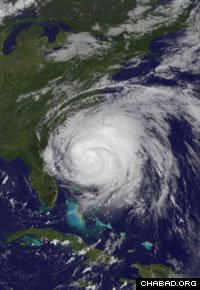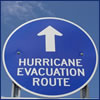As authorities extended hurricane warnings up the Eastern Seaboard in advance of the slow-moving, but strong Hurricane Irene, thousands of people began evacuating from low-lying coastal areas along New York’s Long Island, in Lower Manhattan, on the New Jersey shore, down the Delmarva Peninsula, and across the outer banks of North Carolina.
Chabad-Lubavitch emissaries, as well, who in addition to preparing their own homes and synagogues to withstand any possible damage, are helping community members seek higher ground and making arrangements to protect Torah scrolls and holy books.
Outside Atlantic City, N.J., Rabbi Avrohom Rapoport, director of Chabad-Lubavitch of Atlantic and Cape May Counties, described his Ventnor City beachside resort area Friday morning as quickly becoming a ghost town. Shopkeepers boarded up their stores, homeowners secured all exterior furniture, and a line of cars made its way inland. For the rabbi, who was supposed to host a joint weekend program for upwards of 100 people with Chabad-Lubavitch of Bucks County, Pa., on what was supposed to be the area’s largest tourist weekend, the operating principle of the day was to make sure everyone was safe.
“We have a mandatory evacuation in all of the shore towns,” Rapoport said as he packed up his family’s belongings and boarded up his windows. “We are calling everyone from our synagogue, especially elderly people, to encourage them to evacuate and make sure they have somewhere to go.
“This thing looks very scary and very bad,” he continued. “From the ocean to the bay is less than three blocks.”
At 11:00 am Friday, Irene – which devastated the Bahamas, Dominican Republic, Haiti, and Puerto Rico over the past week – was classified by the National Hurricane Center as a strong Category 2 storm with a center about 330 miles south-southwest of Cape Hatteras, N.C., and was moving north at 14 miles per hour. It was packing maximum sustained winds near 105 mph, and was due to make landfall sometime in the evening.
“Irene is a large tropical cyclone,” the weather service said in its latest public advisory. “Hurricane force winds extend outward up to 90 miles from the center, and tropical storm force winds extend outward up to 290 miles.”
Far enough inland to not worry about evacuation orders, Rabbi Moshe Lieblich at Chabad of Wilmington, N.C., reported that most of the people have already left the surrounding beaches.
“This is really my first hurricane here, and I don’t know how to read these things like an expert,” said Lieblich, who moved to the area four years ago. “We stocked up on food and water, and candles and flashlights.”
Lieblich said that Sabbath services would most likely continue as planned, but with heavy rains and gusty wind the likely conditions on Saturday, he doubted that many people would show up.”
Further north near Washington, D.C. – where officials were forced by the approaching storm to cancel this weekend’s dedication of the new Martin Luther King, Jr., memorial – Bruce Pascal was expecting the loss of electrical power to be a probable result when Irene makes it to the area Saturday night.
Pascal has a beach home on the Jersey Shore and regularly attends services at Rapoport’s synagogue. When he heard on the radio Thursday night that authorities were closing public access to the shore after 6:00 a.m., he turned his car around and drove to his beach house to prepare for the storm.
“I did everything I could to secure it. I made sure all the windows were shut, I brought in all the outdoor furniture, I turned off the water to the house, unplugged all the outlets, and placed towels where I thought leaking might be a problem,” detailed the North Potomac, Md., resident. “I secured everything that could possibly be blown away.”
Although he’s been buying a lot of water and batteries to ride out the storm back at his primary home, he said that his real concerns lay with those who live permanently on the shore.
“The good news for us is the sun is supposed to come out after it passes, so we can always light up our grill if we have no electricity. And D.C. tends to recover quicker. It’s an urban area, and there’s always going to be some part that still has power,” explained Pascal. “You prepare for the worst and hope for the best. But I feel sorry for all the small businesses around Atlantic City who, because of the economy, haven’t had a good summer and were counting on this weekend. I also saw vans with elderly people as I was driving out. What are they going to return to?”

Newtown, Pa., resident Stan Paul struck a similar chord. He bought his beach house in August 2008, and was supposed to go down there this weekend with his fellow Chabad-Lubavitch of Bucks County congregants.
“My main concern is for the people who live at the shore, that they get out,” he said. “Hopefully, this storm will turn to the right and this will be a false call.”
Rapoport has seen firsthand the damage hurricanes can inflict on the coast. He was a child when the 1991 Nor’easter caused a neighbor’s roof to plow through the side of his Atlantic City home and a chimney to crash down through the second floor.
“A beach town is a dangerous place to be,” he sighed, explaining his decision to take his family and go before the onset of the Sabbath. “We had miracles in that storm that we’re really not looking to test again.”
Although Rapoport didn’t yet know where they would end up, he listed several possibilities of staying with fellow Chabad-Lubavitch emissaries in Vineland or in Gloucester County. Every choice would still place him and his family closer to the forecasted track of Irene’s eye, but they wouldn’t be on the coast. For those few who have decided, in spite of pleadings from friends and authorities, to stay behind on the shore, Rapoport is working with other synagogues to combine services so that there’s at least a quorum for public prayer.
In Newark, Del., which is not under an evacuation order, Rabbi Eliezer Sneiderman was readying his University of Delaware Chabad House for dozens of incoming freshmen who have found themselves stuck on campus. They arrived Thursday night for the start of the school year next week only to find out that the university had shut down because of Irene. Sneiderman and the campus Hillel canceled a joint program for arriving Jewish students, but the rabbi told parents that if their children had to stay, he would take care of them.
“We’re here, we’re open, and we’re going to have Sabbath dinner tonight regardless of the storm,” Sneiderman declared. “We’re going to have water, board games, flashlights, and whatever else students will need.”
The rabbi said he’d probably get a foot of water in his basement from the storm, but that he’s faced similar problems in the past.
“We can take care of 50 to 100 students over the weekend,” he surmised.

In New York, where people were anticipating mandatory evacuation orders to come down on Saturday in advance of a late-night or early-morning arrival of Irene, many religious Jews decided to evacuate before the onset of the Sabbath. Rabbi Eli Goodman, director of Chabad of the Beaches in Long Beach, said that in addition for his community members, he was worried for his beach-facing apartment and his synagogue.
“We’re taking everything out of the basement levels, prayer books, things like that,” he said. “Elsewhere, people are staying, but the majority are moving out.”
With comparisons already being made between Irene and Hurricane Katrina, which devastated New Orleans back in 2005, Rabbi Yossie Nemes of the Chabad Center of Metairie, La., noted that from his experience helping residents recover, the most important thing people can do is evacuate.
“The first responsibility of any person is the safety of his or her own family,” said Nemes. “As emissaries, our families are also our communities. So we have a role to play in making sure people have the correct information, helping them make the correct decisions, and after the storm, reaching out and making sure everyone is okay.”
Such messages have been well received, reported Rabbi Zalman Paris of the SoHo Center for Jewish Life in the Tribeca section of Manhattan.
“We’re by the water, and there are a lot of high buildings, so people are concerned,” he said. “They’re not exactly sure how to respond. We sent out an e-mail to everyone with tips, important information, and a call for people to help others.
In Commack, N.Y., Lubavitch of Long Island director Rabbi Tuvia Teldon said that he sent instructions to all of his colleagues with guidelines for preparing for the storm and making sure everyone in their respective communities were safe.
“If we need to do anything more to help people after the storm passes,” he added, “we’ll get to work.”





Start a Discussion